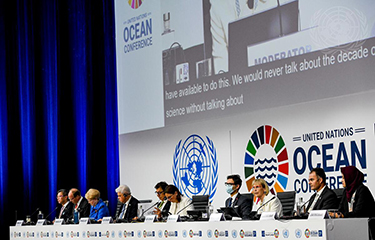Negotiations on a treaty to create a system of management and protection of biodiversity on the high seas have fallen short again.
United Nations member-states have been trying and failing for the past 15 years to reach an ocean conservation agreement that would create a regulatory framework to oversee commercial use of the high seas. Howeveer, attempts at creating an agreement have foundered in part because it would have implications for the control of fishing fleets operating on the high seas. Russia and Iceland have both called for fisheries to be exempted from any agreement.
After the most-recent round of talks at the U.N.’s headquarters in New York City, U.S.A., negotiators remain deadlocked on key issues such as how to regulate the sharing of potential future profits from marine resources in international waters. Negotiators also failed to agree on a process for delineating new marine protected areas, in line with the U.N.’s goal of overseeing the designation 30 percent of global oceans as marine protected areas by 2030, up from the current level of 7 percent.
The failure to get a deal during the talks “shows how far the promises for marine protection made by heads of state and government at the One Ocean Summit and the UN Ocean Conference this year diverge from actual political action,” said the Environmental Justice Foundation (EJF) in a statement.
EJF Founder and CEO Steve Trent said the ocean is critical to a stable global climate and the food security and well-being of the more than three billion people he said depend on marine and coastal biodiversity for their livelihoods.
“If the world's governments are serious about addressing the climate and biodiversity crisis, they must deliver on their promise for an ambitious agreement to protect the high seas by the end of 2022,” he said.
Only 1 percent of total area of the high seas, which make up more than 60 percent of the ocean globally, is protected by international agreements, allowing illegal fishing and related labor abuses to persist, according to Trent.
Greenpeace blamed the most recent failure of talks on the “greed of countries in the High Ambition Coalition and others like Canada and the United States”, a reference to the coalition of 50 countries which earlier vowed to get a deal quickly.
A group of NGOs, including Greenpeace and EJF, are pushing for negotiations on the deal to resume the run-up to the United Nations Biodiversity Conference (COP15) in December 2022.
Photo courtesy of the United Nations







